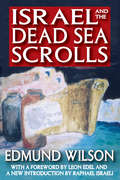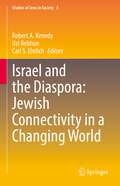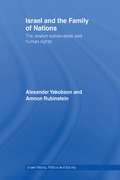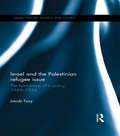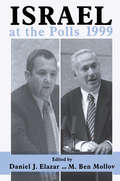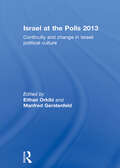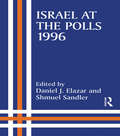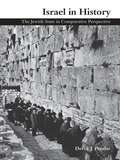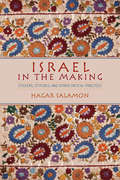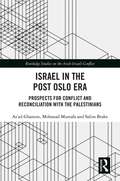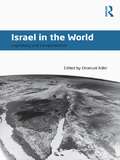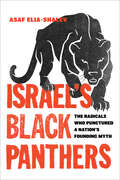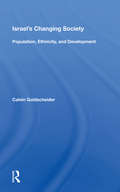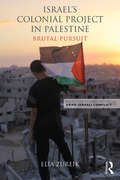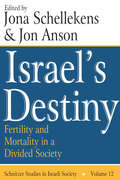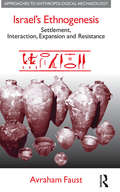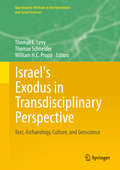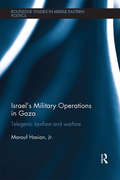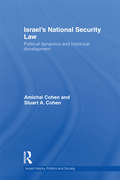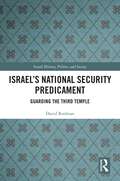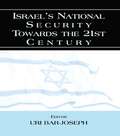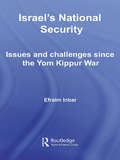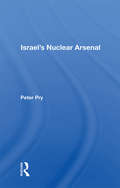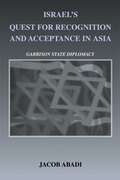- Table View
- List View
Israel and the Dead Sea Scrolls
by Edmund WilsonThe Dead Sea Scrolls, a collection of 972 documents discovered between 1946 and 1956, are of immeasurable religious and historical significance. They include the oldest known surviving copies of Biblical-era documents. The manuscripts shed considerable light on forms of Judaism never known before. These forms contain hints of Christianity, or as put elsewhere, it was the Judaism amid which Christ and his first followers lived, thought, and wrote. Edmund Wilson's book is a record of this great scholarly find. Wilson was a prolific literary critic and social commentator, not an academic, and therefore Israel and the Dead Sea Scrolls reads like a journalist's reportage. This unique personal account weaves together threads of folklore, history, and intrigue. As Leon Edel writes in his foreword, -Reading him, it is not difficult to imagine the ardor with which Edmund Wilson pursued his complex subject; it was the kind of subject he had always liked best, involving as it did history, politics, ancient lore, and all his faculties for imaginative reconstruction and historical analysis. . . . No book quite like this has been written in our century.- The scrolls of the Essenes, and the history of this Jewish sect's possible antecedence to Christianity, led the author to Israel and to the revelations contained in the scrolls. This book contains his resulting account of the scrolls' history. Originally published in 1978, this edition of Wilson's classic is made contemporary with a new introduction by Raphael Israeli, which illustrates the ongoing academic controversy surrounding the Dead Sea Scrolls.
Israel and the Diaspora: Jewish Connectivity in a Changing World (Studies of Jews in Society #3)
by Uzi Rebhun Robert A. Kenedy Carl S. EhrlichThis collected volume is based on the proceedings of a symposium held in 2018 at York University, Canada, which was held to commemorate the 70th anniversary of Israel. This symposium highlighted contemporary Jewish identity, Israel-Diaspora relations, and how Jewish life has been transformed in light of various types of antisemitism. The book considers the diasporic Jewish experiences through examining the intersections between various Jewish communities sociologically, historically, and geographically.The text covers world Jewry in general, and each of the diaspora and Israeli Jewries more specifically in the context of mutual responsibility, but also focuses on areas of tension concerning values and political matters. The challenges of antisemitism, racism, and nationalism are explored in terms of the relationship of the Jewish diasporas to their host countries. This text also covers antisemitism, which may take the form of traditional antisemitism or of the new antisemitism in the era of anti-Israel activity related to the Boycott, Divestment, and Sanctions movement. The latter movement is especially prevalent on university campuses and has an impact on students, faculty, and staff. This volume is unique in its international perspective in examining issues of Jewish identity, Israel-diaspora relations, and antisemitism and will appeal to students and researchers working in the field.
Israel and the Family of Nations: The Jewish Nation-State and Human Rights (Israeli History, Politics and Society)
by Alexander Yakobson Amnon RubinsteinCan Israel be both Jewish and truly democratic? How can a nation–state, which incorporates a large national minority with a distinct identity of its own be a state of all its citizens? Written by two eminent Israeli scholars, a professor of constitutional law and a historian, Alexander Yakobson and Amnon Rubinstein are the first to treat Zionism and Israeli experience in light of other states’ experiences and in particular of newly established states that have undergone constitutional changes and wrestled with issues of minorities. Citing various European, constitutions and laws, the authors explore concept of a Jewish State and its various meanings in the light of international law, and the current norms of Human Rights as applied to other democratic societies compatible with liberal democratic norms and conclude that international reality does not accord with the concept which regards a modern, liberal democracy as a culturally "neutral" and a nationally colourless entity. In light of the new political map in Israel and the prospect of future disengagement from the West Bank, Israel and the Family of Nations is essential reading for all those who wish to understand Israel’s future challenges.
Israel and the Palestinian Refugee Issue: The Formulation of a Policy, 1948-1956 (Israeli History, Politics and Society)
by Jacob TovyExamining the development of Israel’s policy toward the Palestinian refugee issue, this book spans the period following the first Arab-Israeli War until the mid-1950s, when the basic principles of Israel’s policy were finalized. Israel and the Palestinian Refugee Issue outlines and analyzes the various aspects that, together, created the mosaic of the "refugee problem" with which Israel has since had to contend. These aspects include issues of repatriation, resettlement, compensation, blocked bank accounts, internal refugees and family reunification. Drawing on extensive archival research, this book uses documents from Israeli government meetings, from the Foreign Affairs and Defense Committee and files from the office of the Prime Minister’s advisor on Arab affairs to address the many diverse aspects of this topic, and will be essential reading for academics and researchers with an interest in Israel, the Middle East, and political science more broadly.
Israel at the Polls 1999: Israel: the First Hundred Years, Volume III (Israeli History, Politics and Society #Vol. 16)
by Daniel J. Elazar; M. Ben MollowThe 1999 Israeli elections focused on the character of the main political contenders for prime minister - Binyamin Netanyahu and Ehud Barak. Along with Barak's victory, the Israeli public made important statements concerning the shape and direction of Israeli political culture with a hope of a centrist vision. Leading Israeli political scientists discuss the revival of the Israeli left and the increased strength of ethnic Sephardi, Russian and Arab electorates. They also examine the place of foreign policy, media, and other socio-economic factors on the outcome of the election.
Israel at the Polls 2013: Continuity and Change in Israeli Political Culture
by Eithan Orkibi and Manfred GerstenfeldThe 2013 elections took place less than two years after the overwhelming wave of social protests of summer 2011. At first, the election campaign did not raise much public interest, but the emergence of new players and young political forces energized the political race. Polls conducted throughout the campaign greatly deviated from the final results, which eventually enabled Prime Minister Benjamin Netanyahu to form a cabinet again, despite a loss of 11 seats for his list.This book describes and analyses a variety of political and sociological developments in Israel both before and after the elections. These include the nature of the campaign, the developments in the National Camp, among religious Zionists, the ultra-Orthodox parties, and the Russian vote. Furthermore, it assesses the impact of media, including new media.The variety of subjects makes the book suitable for undergraduate and graduate students in Middle-Eastern, Israeli, and Jewish studies, as well as political science and liberal arts in general. Israel at the Polls has been updated and published regularly for thirty-five years, providing readers with up-to-date analysis and continuity of scholarship. This book offers a long-term assessment of Israeli politics. This book was published as a special issue of Israel Affairs.
Israel at the Polls, 1996 (Israeli History, Politics and Society)
by Daniel J. Elazar Shmuel SandlerThe 1996 Israeli elections were the first elections by direct vote for the position of prime minister in which a newcomer - Binyamin Netanyahu - defeated the most veteran Israeli politician, Shimon Peres. The result indicated not only a transition of power from the left-centre to the right-centre, but also the decline of the major parties and the ascendance of the smaller parties. Israel at the Polls, 1996 looks at the parties, election campaigns and the processes that determined this outcome. Major issues such as religion and politics, Israel as a Jewish state, the peace process, and the 'new politics' are analysed by outstanding Israeli political scientists.
Israel in History: The Jewish State in Comparative Perspective
by Derek PenslarCovering topical issues concerning the nature of the Israeli state, this engaging work presents essays that combine a variety of comparative schemes, both internal to Jewish civilization and extending throughout the world, such as: modern Jewish society, politics and culture historical consciousness in the twentieth century colonialism, anti-colonialism and postcolonial state-building. With its open-ended, comparative approach, Israel in History provides a useful means of correcting the biases found in so much scholarship on Israel, be it sympathetic or hostile. This book will appeal to scholars and students with research interests in many fields, including Israeli Studies, Middle East Studies, and Jewish Studies.
Israel in the Making: Stickers, Stitches, and Other Critical Practices
by Hagar SalamonThe brilliant kaleidoscope of everyday creativity in Israel is thrown into relief in this study, which teases out the abiding national tensions and contradictions at work in the expressive acts of ordinary people. Hagar Salamon examines creativity in Israel’s public sphere through the lively discourse of bumper stickers, which have become a potent medium for identity and commentary on national and religious issues. Exploring the more private expressive sphere of women’s embroidery, she profiles a group of Jerusalem women who meet regularly and create "folk embroidery." Salamon also considers the significance of folk expressions at the intersections of the public and private that rework change and embrace transformation. Far ranging and insightful, Israel in the Making captures the complex creative essence of a nation state and vividly demonstrates how its citizens go about defining themselves, others, and their country every day.
Israel in the Post Oslo Era: Prospects for Conflict and Reconciliation with the Palestinians (Routledge Studies on the Arab-Israeli Conflict)
by Mohanad Mustafa As'ad Ghanem Salim BrakeIsrael in the Post Oslo Era examines the official Israeli stands and policies towards the Palestinian problem from the beginning of the twenty-first century. The book argues that Israel is gradually withdrawing from the commitment of a two-state solution and from the general framework of the peace process that started in 1993 with the signing of the Oslo accord. The main factor behind Israel’s shift regarding the conflict and its resolution is related to the steady and gradual rise of the Israeli right since the 2009 general elections, to reach the "dominant block" status. These fundamental changes are the result of profound social transformations, such as the functional significance of marginal groups. The unprecedented growth of the right disputes basic questions, addressed in this book, including the official Israeli approach towards the Palestinian problem in general, particularly the two-state solution. The book examines these developments and the overall Israeli withdrawal from the peace process and its commitment to a two-sate solution. Israel in the Post Oslo Era is an invaluable resource for students and researchers interested in Arab-Israeli conflict resolutions, Middle East and Israeli Politics.
Israel in the World: Legitimacy and Exceptionalism
by Emanuel AdlerSince independence, Israel has lived with a paradox, needing and seeking legitimacy, understanding, and empathy from the world community while simultaneously also discounting the world. This volume reflects upon Israel’s troubled attempts to balance its desire to be different from a world that it simultaneously genuinely needs and that it also wants to be a legitimate member of. Gathering distinguished scholars and public figures, this timely book discusses the causes and consequences of Israel’s unsettled relations with the world. With essays ranging from an account of Israel’s exile mentality and the cosmopolitanism of suffering to a fragmenting international legal order and whether an authentic religious process can transform religion into a powerful lever for peace, the book’s innovative analysis will spark both academic and public debate. Israel in the World: Legitimacy and Exceptionalism will appeal to scholars and students with broad ranging research interests including Middle East Studies, Israeli Studies and international relations more generally.
Israel's Black Panthers: The Radicals Who Punctured a Nation's Founding Myth
by Asaf Elia-ShalevThe powerful story of an activist movement that challenged the racial inequities of Israel. Israel's Black Panthers tells the story of the young and impoverished Moroccan Israeli Jews who challenged their country's political status quo and rebelled against the ethnic hierarchy of Israeli life in the 1970s. Inspired by the American group of the same name, the Black Panthers mounted protests and a yearslong political campaign for the rights of Mizrahim, or Jews of Middle Eastern ancestry. They managed to rattle the country's establishment and change the course of Israel's history through the mass mobilization of a Jewish underclass. This book draws on archival documents and interviews with elderly activists to capture the movement's history and reveal little-known stories from within the group. Asaf Elia-Shalev explores the parallels between the Israeli and American Black Panthers, offering a unique perspective on the global struggle against racism and oppression. In twenty short and captivating chapters, Israel's Black Panthers provides a textured and novel account of the movement and reflects on the role that Mizrahim can play in the future of Israel.
Israel's Changing Society: Population, Ethnicity, And Development
by Calvin GoldscheiderThis book provides the most up-to-date assessment of Israel's society today, portraying the country's ethnic diversity, its economy, and demographic changes. Revealing linkages between demographic transformation and socioeconomic change, Goldscheider shows how ethnic group formation emerged in Israel to create the present mix of Jewish and Arab populations. He also reviews the policies of Palestinian and Israeli governments concerning immigration, describing the ways in which socioeconomic development within Israel, urbanization, and industrialization have evolved through the use of outside capital and increasing dependency. The book reveals two unique sets of processes about Israel today. The first concerns important changes in marriage, family and intermarriage, educational attainment and occupational achievement, ethnic politics, religion, and the changing role of women. A second but related concern pertains to the social and economic contexts of community life. Here Goldscheider investigates rapid change among Israel's major urban centers, towns, and agricultural centers, including the Kibbutz as well as Arab communities. In concluding chapters, the author discusses the role of government in shaping population policy, including health, fertility, and contraceptive and abortion issues. He also describes the influence of Jewish communities outside of Israel and the impact of the Middle East conflict with Arab states on Israel's domestic policy as well as the conflict with populations in territories administered by Israel since 1967. Likely to be a standard reference for years to come, the book is essential reading for political scientists, sociologists, anthropologists, and historians concerned with Israel's politics and society.
Israel's Colonial Project in Palestine: Brutal Pursuit (Routledge Studies on the Arab-Israeli Conflict)
by Elia ZureikColonialism has three foundational concerns - violence, territory, and population control - all of which rest on racialist discourse and practice. Placing the Zionist project in Israel/Palestine within the context of settler colonialism reveals strategies and goals behind the region’s rules of governance that have included violence, repressive state laws and racialized forms of surveillance. In Israel’s Colonial Project in Palestine: Brutal Pursuit, Elia Zureik revisits and reworks fundamental ideas that informed his first work on colonialism and Palestine three decades ago. Focusing on the means of control that are at the centre of Israel’s actions toward Palestine, this book applies Michel Foucault’s work on biopolitics to colonialism and to the situation in Israel/Palestine in particular. It reveals how racism plays a central role in colonialism and biopolitics, and how surveillance, in all its forms, becomes the indispensable tool of governance. It goes on to analyse territoriality in light of biopolitics, with the dispossession of indigenous people and population transfer advancing the state’s agenda and justified as in the interests of national security. The book incorporates sociological, historical and postcolonial studies into an informed and original examination of the Zionist project in Palestine, from the establishment of Israel through to the actions and decisions of the present-day Israeli government. Providing new perspectives on settler colonialism informed by Foucault’s theory, and with particular focus on the role played by state surveillance in controlling the Palestinian population, this book is a valuable resource for students and scholars interested in the Arab-Israeli Conflict and Colonialism.
Israel's Destiny: Fertility and Mortality in a Divided Society
by AuthorFor over a hundred years, demography has been at the heart of the Zionist project, reflected in the goal of creating and maintaining a Jewish majority in Israel and in ensuring the physical continuation of the Jewish people. Demography continues to be an essential issue in the current struggle between Israel and Palestine. Yet in academic discourse, demography is treated as a minor, largely technical side-issue in the social sciences, with little theoretical consideration given to population processes as social processes. Israel's Destiny: Fertility and Mortality in a Divided Society brings together important recent work in this area. The contributions to Israel's Destiny focus on the influence of religion, religiosity, nationalism, and ethnicity on fertility and mortality in Israel.Israel's Destiny is divided into four sections: the first focuses on fertility, particularly Israel's apparently high birth rate when compared with other countries with a similar standard of living; the second looks at patterns of nuptiality and contraception and the way marriage patterns are shaping group boundaries; the third looks at mortality, particularly among men; and the fourth looks at social policy effects of the demographic process.The main focus is that differential reproduction of the population by national and ethnic group, as well as social class--through fertility and mortality--and the social structuring of the population--through marriage patterns--are critical elements in the creation and evolution of Israeli society. The editors' introduction places all these studies in a wider perspective of current demographic research. The volume provides a concise population history of the state of Israel to help the reader put the studies in their proper local and historical context.
Israel's Ethnogenesis: Settlement, Interaction, Expansion and Resistance (Approaches To Anthropological Archaeology Ser.)
by Avraham FaustWinner (for best semi-popular book) of the 2008 Irene Levi-Sala Prize for publications on the archaeology of Israel. The emergence of Israel in Canaan is a central topic in biblical/Syro-Palestinian archaeology. However, the archaeology of ancient Israel has rarely been subject to in-depth anthropological analysis until now. 'Israel's Ethnogenesis' offers an anthropological framework to the archaeological data and textual sources. Examining archaeological finds from thousands of excavations, the book presents a theoretical approach to Israel's ethnogenesis that draws on the work of recent critics. The book examines Israelite ethnicity - ranging from meat consumption, decorated and imported pottery, Israelite houses, circumcision, and hierarchy - and traces the complex ethnic negotiations that accompanied Israel's ethnogenesis. Israel's Ethnogenesis is unique in its contribution to the archaeology of ethnicity, offering an anthropological study that will be of interest to students of history, Israelite culture and religion, and the evolution of ethnic groups.
Israel's Exodus in Transdisciplinary Perspective
by Thomas Schneider Thomas E. Levy William H.C. ProppThe Bible's grand narrative about Israel's Exodus from Egypt is central to Biblical religion, Jewish, Christian, and Muslim identity and the formation of the academic disciplines studying the ancient Near East. It has also been a pervasive theme in artistic and popular imagination Israel's Exodus in Transdisciplinary Perspective is a pioneering work surveying this tradition in unprecedented breadth, combining archaeological discovery, quantitative methodology and close literary reading. Archaeologists, Egyptologists, Biblical Scholars, Computer Scientists, Geoscientists and other experts contribute their diverse approaches in a novel, transdisciplinary consideration of ancient topography, Egyptian and Near Eastern parallels to the Exodus story, the historicity of the Exodus, the interface of the Exodus question with archaeological fieldwork on emergent Israel, the formation of biblical literature, and the cultural memory of the Exodus in ancient Israel and beyond. This edited volume contains research presented at the groundbreaking symposium "Out of Egypt: Israel's Exodus Between Text and Memory, History and Imagination" held in 2013 at the Qualcomm Institute of the University of California, San Diego. The combination of 44 contributions by an international group of scholars from diverse disciplines makes this the first such transdisciplinary study of ancient text and history. In the original conference and with this new volume, revolutionary media, such as a 3D immersive virtual reality environment, impart innovative, Exodus-based research to a wider audience. Out of archaeology, ancient texts, science and technology emerge an up-to-date picture of the Exodus for the 21st Century and a new standard for collaborative research.
Israel's Military Operations in Gaza: Telegenic Lawfare and Warfare (Routledge Studies in Middle Eastern Politics)
by Marouf Hasian JrCivilians in Gaza and Israel are caught up in complex, violent situations that have overstepped conventional battle lines. Both sides of the conflict have found ways to legitimate the use of violence, and continually swap accusations of violations of domestic and international humanitarian laws. Israel’s Military Operations in Gaza provides an ideological critique of the legal, military, and social media texts that have been used to legitimate historical incursions into the Gaza, with special focus on Operation Protective Edge. It argues that both the Palestinians and the Israelis have deployed various forms of ‘telegenic’ warfare. They have each used argumentative rhetorics based on competing interpretations of events, and are locked in a battle to convince international audiences and domestic constituencies of the righteousness of their causes. This critical genealogical study analyses a range of texts and images, from selfies circulated near the Gaza border to judicial opinions produced by the High Court of Israel. With its multidisciplinary approach and original analysis of the Israel/Gaza situation, this book will be of interest to students and scholars of Middle East studies and the Arab-Israeli conflict, as well as security studies and communication studies.
Israel's National Security Law: Political Dynamics and Historical Development (Israeli History, Politics and Society)
by Stuart Cohen Amichai CohenTerror attacks on western civilian targets have stimulated interest in the dilemmas faced by liberal societies when combating threats to national security. Combining the perspectives of political science and law, this book addresses that discourse, asking how democracies seek to harmonize the protection of individual liberties with the defence of state interests. The book focuses on the experience of Israel, a country whose commitment to democratic values has continuously been challenged by multiple threats to national survival. It examines the legal, legislative and institutional methods employed to resolve the dilemmas generated by that situation, and thus provides a unique interpretation of Israeli national security behaviour. Policy-making and policy-implementation in this sphere, it shows, have reflected not just external constraints but also shifts in the domestic balance of power between the executive, the legislature and the judiciary. The book concludes with an agenda of the measures that each branch of government needs to implement in order to repair the flaws that have developed in this system over time. Based on a close reading of legislative and court readings, the book proposes a new taxonomy for the analysis of national security legal frameworks, both in Israel and elsewhere in the democratic world. As such it will be of great interest to students and scholars of political science, national security law, Israeli history and civil-military relations.
Israel's National Security Predicament: Guarding the Third Temple (Israeli History, Politics and Society)
by David RodmanThis book provides a ground-breaking assessment of the Israeli national security experience from the establishment of the country through to the present day. Seventy-five years after its establishment, the State of Israel continues to face an acute national security predicament as a result of the still unresolved Arab–Israeli conflict. This monograph offers a new framework for analyzing this experience, first exploring the crucial events of the past and present that define it, including interstate wars, asymmetrical wars, low-intensity conflicts, and developments in weapons of mass destruction. The book then probes how Israel’s evolving national security doctrine has addressed these various challenges over the years, highlighting the roles of a number of variables: deterrence, warning, and decision; strategic depth and defensible borders; the quality and quantity of fighting men and machines; intelligence; self-reliance in military matters; foreign policy; and the influence of ethnic demography, societal resilience, economic prosperity, and water security. Written in accessible, non-technical language, the book will appeal to general readers seeking an introduction to Israeli security, as well as to specialists and researchers in various fields, including Israeli history, Middle Eastern politics, and security studies.
Israel's National Security Towards the 21st Century
by Uri Bar-JosephThis volumes discusses three principal issues: the Israeli army and the Revolution of Military Affairs (RMA); Israel's present and future answers to the threays of weapons of mass destruction (WMD); and the impact of societal, political, and technological changes on Israel's future war objectives.
Israel's National Security: Issues and Challenges Since the Yom Kippur War (Israeli History, Politics and Society)
by Efraim InbarThis volume presents a comprehensive analysis of Israel's security challenges since the 1973 October War. Efraim Inbar takes the reader on a historical journey through Israel's relations in the Middle East that begins with an analysis of Israel's strategic thinking after 1973 and ends with an important look at the recent Second Lebanese War and the Iranian nuclear challenge. Israel's National Security delves not only into Israel's responses, but also its relationships in the international community, providing a complete picture of how Israel's strategic environment has evolved over time. Relevant to today's current political atmosphere, the volume dissects the influences of the growing appeal of Islamic extremism on the peace process, Israel strategic partnerships with India and Turkey, and Israel's relations with the Palestinians.
Israel's Nuclear Arsenal
by Peter PryIsrael's Nuclear Arsenal is a full inquiry into the likely size and sophistication of the Israeli nuclear weapons program. Among the key questions it addresses are: Did other nations—the United States, France, or West Germany, for example—assist Israel in developing its nuclear weapons capacity? What is the nature of Israel's industrial nuclear inf
Israel's Quest for Recognition and Acceptance in Asia: Garrison State Diplomacy (Israeli History, Politics and Society #No. 34)
by Jacob AbadiThis title represents a comprehensive study of Israel's attempts to build diplomatic relations with countries on the Asian continent. The author argues that, despite the persistence of the Arab Israeli conflict, the Israeli Foreign Ministry was remarkably successful in gaining recognition in most Asian countries. He provides an overview of Israel's relations with Asian countries from 1948 until the present, and analyses the political, social and economic factors in each country and the role that each played in the process of rapprochement with Israel. He explores the reasons for Israel's successes as well as its failures, and analyses the flaws in Israeli diplomacy.
Israel's Security Networks
by Gabriel Sheffer Oren BarakSince the establishment of the State of Israel in 1948, and particularly after the Israeli-Arab War of 1967, a highly informal but simultaneously potent security network has influenced Israel's domestic sphere. Composed of acting and former security personnel and their partners in the state's various civilian spheres, this security network has affected Israeli culture, politics, society, economy, public discourse and foreign relations. This book discusses this major sociopolitical phenomenon and its effects in a comparative and theoretical perspective. First, it defines Israel's security network in a broad theoretical and comparative perspective. Second, it explains how Israel's security network emerged and acquired a hegemonic position in the area of national security and foreign policy. Third, it describes the security network and identifies its members. Fourth, it discusses and explains the multitude of roles that Israel's security network has come to play both domestically and externally. Fifth, it discusses similar phenomena in other relevant cases. Finally, it presents general analytical and theoretical conclusions.
